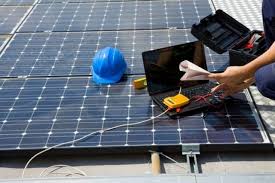Repairing solar panels typically involves addressing issues that can affect their efficiency and longevity. Here’s a detailed exploration:
**1. ** Physical Damage: Solar panels are exposed to various weather conditions and physical damage. Cracks or breaks in the glass covering can occur due to hailstorms or accidental impact. Repairing these involves replacing the damaged glass or sometimes the entire panel if the damage is extensive.
**2. ** Electrical Issues: The electrical components of solar panels can malfunction over time. This might include problems with inverters, junction boxes, or wiring connections. Repairs involve diagnosing the specific issue, replacing faulty components, or rewiring connections to ensure proper functioning.
**3. ** Water Leakage: Improper sealing or damage to the panel’s frame can lead to water ingress, potentially causing electrical shorts or corrosion. Repairing this requires resealing the affected area or replacing damaged seals to prevent further water infiltration.
**4. ** Panel Degradation: Over time, solar panels can degrade due to exposure to sunlight and environmental factors. This degradation can manifest as discoloration, delamination (layers separating), or reduced efficiency. Repair strategies may involve cleaning to improve efficiency, applying protective coatings, or in some cases, replacing the panel entirely.
**5. ** Microcracks: Microcracks can develop over time in solar cells, especially in older panels or those exposed to frequent temperature fluctuations. These cracks can reduce panel efficiency. Repair methods might include applying conductive adhesive or encapsulants to prevent further damage and maintain performance.
**6. ** Inverter Failures: Inverters are critical components that convert DC power generated by solar panels into usable AC power. Failures can occur due to age, electrical surges, or manufacturing defects. Repairing or replacing inverters is essential to ensure the continuous operation of the solar system.
**7. ** Tracking System Issues: Some solar systems use tracking systems to maximize sunlight exposure throughout the day. Issues with these systems, such as motor failures or misalignment, can reduce energy production efficiency. Repairs involve diagnosing and repairing mechanical or electrical faults in the tracking system.
**8. ** Maintenance: Regular maintenance is crucial to prevent common issues and extend the lifespan of solar panels. This includes cleaning panels to remove dust, debris, or bird droppings that can reduce efficiency, as well as inspecting connections and mounts for signs of wear or corrosion.
In conclusion, while solar panels are designed to be durable and low-maintenance, various issues can arise over time that require repair or maintenance to ensure optimal performance and longevity. Professional assessment and timely repairs are essential to maximize energy production and return on investment from solar panel installations.
What should I expect during a solar panel repair service?
During a solar panel repair service, several key steps and expectations can help ensure the process goes smoothly and effectively:
- Initial Assessment: The repair service typically begins with an initial assessment of the solar panel system. A technician will inspect the panels, inverters, wiring, and other components to identify the root cause of the issue. This assessment helps determine the scope of repairs needed and provides a basis for cost estimation.
- Diagnostics: Once the initial assessment is complete, the technician will conduct diagnostics to pinpoint specific problems. This may involve testing electrical connections, checking for physical damage, or using specialized equipment to evaluate panel performance. Diagnostics are crucial for accurately diagnosing issues and planning appropriate repair strategies.
- Repair Proposal: Based on the assessment and diagnostics, the technician will present a repair proposal outlining recommended solutions and associated costs. This proposal may include repairing damaged panels, replacing faulty components like inverters or wiring, or addressing other identified issues. It’s essential to review and approve the repair proposal before work begins to ensure clarity and alignment with expectations.
- Scheduling and Logistics: Once the repair plan is approved, the service provider will schedule a convenient time for the repairs to be conducted. This may involve coordinating with the homeowner or business owner to minimize disruption to daily activities. Clear communication regarding scheduling and logistics helps ensure a smooth repair process.
- Repair Execution: On the scheduled repair day, the technician will arrive equipped with the necessary tools, equipment, and replacement parts. The specific repair process will depend on the nature of the identified issues. Common repair tasks may include replacing damaged glass or seals, repairing electrical connections, replacing inverters, or addressing other technical problems.
- Quality Assurance: Throughout the repair process, the technician will focus on ensuring the quality and effectiveness of the repairs. This may involve testing repaired components, verifying electrical connections, and conducting performance tests to ensure that the solar panel system operates efficiently after repairs are completed.
- Cleanup and Final Inspection: Once repairs are finished, the technician will clean up the work area and conduct a final inspection of the repaired components. This inspection ensures that all repairs have been properly executed and that the solar panel system is ready to resume normal operation. The technician may also provide recommendations for ongoing maintenance to prevent future issues and maximize system performance.
- Documentation and Warranty: After completing repairs, the service provider should provide documentation detailing the work performed, any replaced components, and warranty information. This documentation is important for record-keeping and may be required for warranty claims or future service needs.
- Customer Satisfaction: Throughout the repair service, the technician should prioritize customer satisfaction by addressing any concerns, providing clear explanations of the repair process, and ensuring that the solar panel system meets or exceeds performance expectations post-repair.
Overall, a well-executed solar panel repair service involves thorough assessment, diagnostics, transparent communication, expert repair execution, and a focus on customer satisfaction. By understanding what to expect during the repair process, homeowners and businesses can confidently manage solar panel maintenance and ensure the long-term reliability and efficiency of their solar energy systems.

